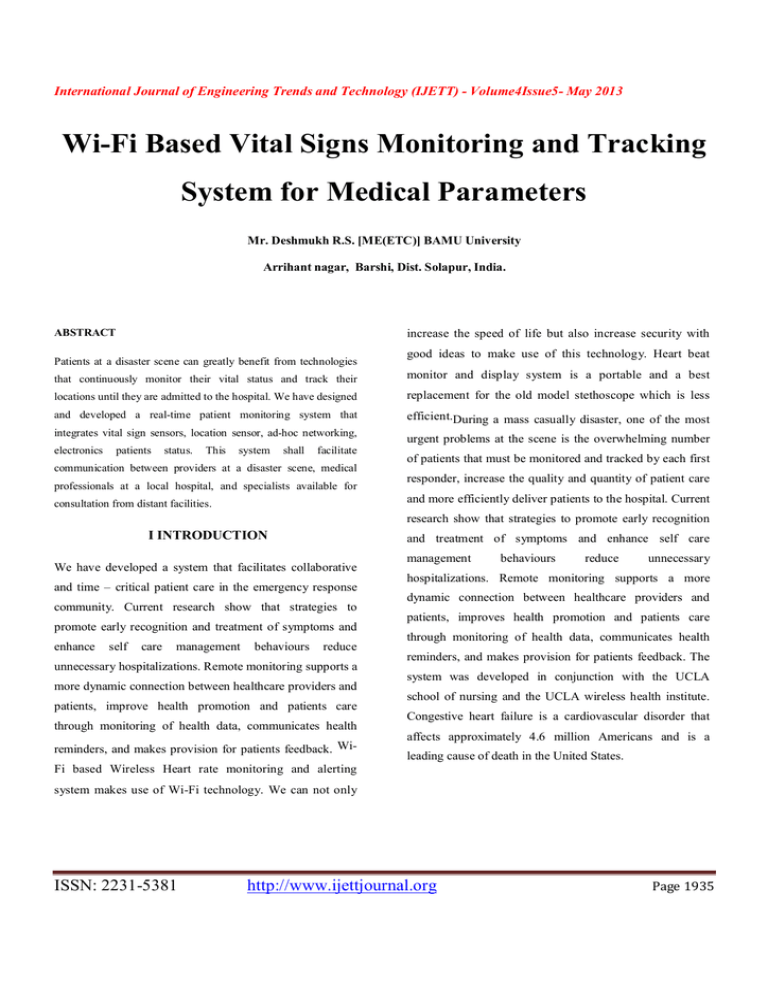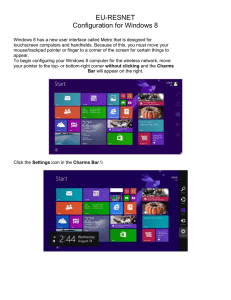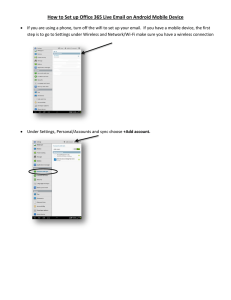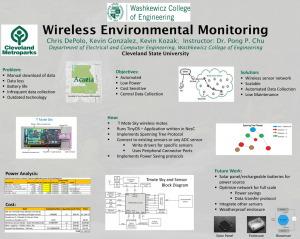Wi-Fi Based Vital Signs Monitoring and Tracking System for Medical Parameters
advertisement

International Journal of Engineering Trends and Technology (IJETT) - Volume4Issue5- May 2013 Wi-Fi Based Vital Signs Monitoring and Tracking System for Medical Parameters Mr. Deshmukh R.S. [ME(ETC)] BAMU University Arrihant nagar, Barshi, Dist. Solapur, India. ABSTRACT increase the speed of life but also increase security with Patients at a disaster scene can greatly benefit from technologies good ideas to make use of this technology. Heart beat that continuously monitor their vital status and track their monitor and display system is a portable and a best locations until they are admitted to the hospital. We have designed replacement for the old model stethoscope which is less and developed a real-time patient monitoring system that efficient.During a mass casually disaster, one of the most integrates vital sign sensors, location sensor, ad-hoc networking, electronics patients status. This system shall facilitate communication between providers at a disaster scene, medical professionals at a local hospital, and specialists available for urgent problems at the scene is the overwhelming number of patients that must be monitored and tracked by each first responder, increase the quality and quantity of patient care and more efficiently deliver patients to the hospital. Current consultation from distant facilities. research show that strategies to promote early recognition I INTRODUCTION and treatment of symptoms and enhance self care We have developed a system that facilitates collaborative and time – critical patient care in the emergency response community. Current research show that strategies to promote early recognition and treatment of symptoms and enhance self care management behaviours reduce unnecessary hospitalizations. Remote monitoring supports a more dynamic connection between healthcare providers and patients, improve health promotion and patients care through monitoring of health data, communicates health reminders, and makes provision for patients feedback. Wi- management behaviours reduce unnecessary hospitalizations. Remote monitoring supports a more dynamic connection between healthcare providers and patients, improves health promotion and patients care through monitoring of health data, communicates health reminders, and makes provision for patients feedback. The system was developed in conjunction with the UCLA school of nursing and the UCLA wireless health institute. Congestive heart failure is a cardiovascular disorder that affects approximately 4.6 million Americans and is a leading cause of death in the United States. Fi based Wireless Heart rate monitoring and alerting system makes use of Wi-Fi technology. We can not only ISSN: 2231-5381 http://www.ijettjournal.org Page 1935 International Journal of Engineering Trends and Technology (IJETT) - Volume4Issue5- May 2013 Congestive heart failure is a condition in which heart be sensed by using a circuit formed by the combination transmitted data can be viewed locally or via the Web. We introduce a concept of reference design which called Wireless Patient monitor sensor platform (WSP) architecture, WSP offer flexibility of reducing development time . The WSP firmware automatically sends different types of warning and notifications to desire destination, or as e-mail directly to Doctor ‘s PDA/Laptop by using Open standard transportation protocol and leave Voice message.WSP can Continuously do health monitoring and control. The WSP firmware monitors all important vital parameters like temperature, blood pressure, ECG ,SPO2 etc. continuously. of an LDR and LED. Depending upon the rate of Block diagram: function is inadequate to supply oxygenated blood to the patient. Remote monitoring programs provides a potentially feasible option for dealing with expanding population of patients that have CHF but are unable to access clinics due to either a lack of resources, location, or infirmity. The functioning of this device is based on the truth that the blood circulates for every one heart beat which can circulation of blood per second the heart beat rate per minute is calculated. This device consists of a micro controller which takes the input from the heart beat sensor and calculates the heart rate of the patient. The micro controller also takes the responsibility to convey the same information to the remote PC via wireless communication. II SYSTEM DEVELOPMENT The project aims in designing a system which helps in remote monitoring of patients heart rate, body temperature based on Wi-Fi communication. The medical parameters can be monitored on website in real-time. The advantage of this is the system is that doctors across the world can monitor the medical parameters and suggest the suitable medication. WiFi Based Monitoring system for medical parameter has resulted from the helps in remote monitoring of patients heart rate, body temperature. This system has the advantages is that doctors across the world can monitor the medical parameters and suggest the suitable medication. The web communication is very the economical compare to any other modes of communication for longer distances. Through the Wireless sensors, and Sensor network, Whether it is an ECG, blood pressure values, blood glucose level, pulse oximeter, weight, or other vital signs. All those Vital parameter are effectively transferred to a monitoring center enabling accurate diagnosis. The patient information and the ISSN: 2231-5381 http://www.ijettjournal.org Page 1936 International Journal of Engineering Trends and Technology (IJETT) - Volume4Issue5- May 2013 MEDICAL PARAMETERS ” Heart failure is a leading cause of death in USA, and there are about 4,600,000 Americans currently suffering from heart failure. Wireless health technology that uses sensors and wireless communication methods can help those heart failure patients by monitoring them and providing guidance and feedback. Using this system we can find the number of disease from the patient’s body when they are at home and quickly start the treatment on that disease and the death ratio will get decreases. Future Scope : In the future we can use new technologies in this model, which is used by hospital easily. We have designed and Advantages: developed a real-time patient monitoring system that 1) Death ratio is reduced due to this system. integrates vital sign sensors, location sensor, ad-hoc networking, electronics patients status. 2) No use of old model stethoscope REFERENCES 3) Easy to use this system 4) Their is no needs to get patient in the hospital when you 1.Haider, A. W., Systolic blood pressure, diastolic blood pressure, and pulse pressure as predictors of risk for are use this system. congestive heart failure in the Framingham Heart Study. 5) Treatment will be started as per doctor’s prisciption. Ann. Intern. Med. 138(1):10–16, 2006 2.Chaudhry, S. I., et al., Randomized trial of telemonitoring Disadvantages : to improve heart failure outcomes (Tele-HF): study design. J. Card. Fail. 13(9):709–714, 2007. 1) Hard to handle model. 3. Desai Akshay, S., et al., The circle from home to heart2) Their are two models, thats why it is costly. failure disease management. N. Engl. J. Med. 363:2364– 2367, 2010. 4. Suh, M. K., Evangelista, L., et al., WANDA B.: Weight III CONCLUSION AND FUTURE SCOPE and Activity with Blood Pressure Monitoring System for Heart Failure Patients, IEEE Workshop on Interdisciplinary Conclusion: The proposed “ WI-FI BASED VITAL SIGNS MONITORING AND TRACKING SYSTEM FOR Research on E-health Services and Systems, 2011. 5. Suh, M K, 2010, WANDA B.: Weight and Activity with Blood Pressure Monitoring System for Heart Failure ISSN: 2231-5381 http://www.ijettjournal.org Page 1937 International Journal of Engineering Trends and Technology (IJETT) - Volume4Issue5- May 2013 Patients, The Second International IEEE WoWMoM Workshop on Interdisciplinary Research on E-Health Services and Systems (IREHSS) 6. Hara T, 2006, The relationship between body weight reduction and intensity of daily physical activities assessed with 3-dimension accelerometer, Japanese Journal of Physical Fitness and Sports Medicine 7. Soran, O. Z., et al., A randomized clinical trial of the clinical effects of enhanced heart failure monitoring using a computer based telephonic monitoring system in older minorities and women. J. Card. Fail. 14(9):711–717, 2008. 8. Lloyd-Jones, D., Adams, R., et al., Heart Disease and Stroke Statistics 2009 update: a report from the American Heart Association statistics committee and stroke statistics subcommittee. Circulation 119:e21–e181, 2009. ACKNOWLEDGEMENT The completion of my Paper, “WI-FI BASED VITAL SIGNS MONITORING AND TRACKING SYSTEM FOR MEDICAL PARAMETERS” Would not have been so easy without the guidance of various individuals, who gave an appropriate direction for my efforts. First of all I take a great opportunity to thank my internal project guide Prof S.B Kalyankar who has always given support and encouragement with his valuable guidance throughout my Paper. I would like to express my heart-full gratitude and thanks to my HOD Prof.R.M.Autee for his encouraging support. I am also very grateful for the co operation extended to me by staff members of the college and all the helping hands. DESHMUKH R.S. ISSN: 2231-5381 http://www.ijettjournal.org Page 1938



